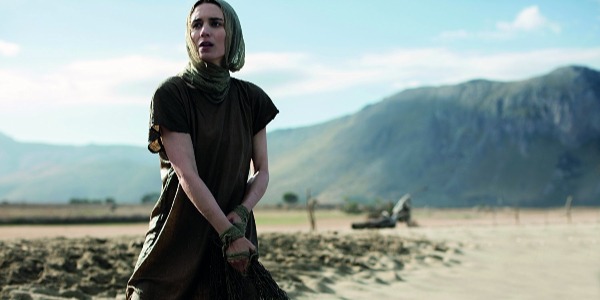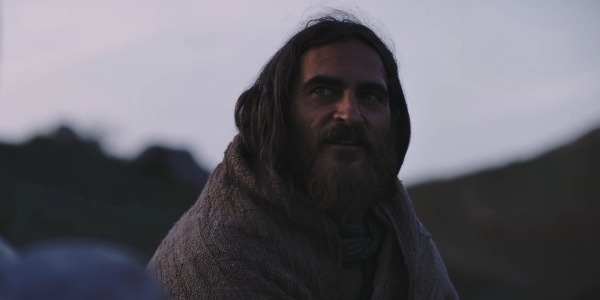MARY MAGDALENE: A Surprisingly Secular Biblical Tale
![Were you familiar with Mary Magdalene before you read the script? Garth Davis: Not in a deep, detailed way, but in the movies I have seen before and in the way everyone kind of understands. When I read this it was a completely different version, so that got me curious. I started to investigate it in a deeper way and found it astonishing it has taken us so long to put that story out there in a more popular light. Extraordinary really. It was definitely different than the story I grew up reading in the bible. I remember when the Passion of the Christ came out, an actor got struck by lightening during shooting. Anything like that happen on set for you? Garth Davis: There were a couple of pretty amazing moments. When we were shooting the scene of the exorcism, where the family was exorcising Mary in the Sea of Galilee, just before we were about to walk into the water the wind just completely stopped. Completely still, almost on cue, right? Then suddenly lightening appeared all over the ocean. It was unbelievable! So much so, that when shooting the scene I had to paint it out. It just felt like a trope, you know? People would have thought it was a visual effect. [laughs] Wow!Garth Davis: The other one was during a scene on the beach of Magdala. I did a drawing of the location and I wanted to add some smoke in the background. So we went down to the Recee, and as I was standing there, smoke emerged exactly where I was drawing it (laughs). It was one of those moments where you have to ask if something was guiding us in some way.](https://www.filminquiry.com/wp-content/uploads/2018/03/MV5BNDc5ODE4OTQxNl5BMl5BanBnXkFtZTgwODEzOTcyNDM_V1_SY1000_CR0014991000_AL_.jpg)
Alistair is a 25 year old writer based in Cambridge.…
It isn’t until the postscript of Mary Magdalene that Garth Davis’ film confronts the elephant in the room: the widespread belief that she was a prostitute, a myth that grew in infamy across Western religion from the late 6th century onwards. In actuality, Mary of Magdalene was referenced approximately 12 times across the New Testament, most notably as being one of the only named witnesses to Jesus’ crucifixion, and the first witness to his subsequent resurrection.
There’s very little information about how she came to follow Jesus, even if she does get name checked more in the holy scripture than his other apostles – and the central issue with Mary Magdalene is that even a characteristically accomplished Rooney Mara performance fails to bring to life a character who is by definition unknowable outside of her proximity to larger events.
A centuries old tale, with new found complexity
This isn’t to say that Davis’ film is a misfire, as the oddly secular tone of Mary Magdalene allows it to explore the contradictions in varying interpretations of faith in a manner that more overtly religious films wouldn’t dream of even attempting. Seeing the events from a perspective other than that of Jesus makes for a richer and more thematically complicated film, for the most part.
The problem is that the perspective of Mary Magdalene could easily be interchanged with any of the other apostles to achieve this – sure, we get to witness the crucifixion by utilising her perspective, but it’s one of the only stagings of Jesus’ final days where the most famous events in his life feel secondary to the theological discussions provoked by earlier events.

In the role of Jesus, Joaquin Phoenix is as outstanding as you’d expect; he makes the decision to portray the son of God with a subtle naivety oddly reminiscent of Michael Jackson, a sensitive messiah figure with humanistic ideals he preaches passionately, even if they don’t hold up under intense scrutiny. Although respectful of religious beliefs and the scripture itself, the screenplay by Helen Edmundson and Philippa Goslett doesn’t shy away from confronting how the humanitarian teachings of Christ are not fully compatible with our cynical world.
For the most part they’ve condensed his lessons down to the recurring theme of “forgiveness” – which in one excellent scene, prompts one woman to confront him by asking how she should forgive the man who raped and murdered the member of her family. Jesus responds with a mini sermon on the nature of forgiveness, and to the credit of the screenplay, it tries to keep this moment as ambiguous as possible as to whether or not that’s an acceptable answer in these circumstances.
This notion of forgiveness is echoed elsewhere in the screenplay through the characterisation of Judas. Portrayed by Tahir Rahim, the actor refuses to lean in to the public perception of the figure, with the lack of overt deception in his motives making him one of the more easily forgivable screen Judas’ in history – which in turn reinforces the message of Jesus elsewhere in the film about the simplicity of forgiveness. It could be argued that the portrayal of Judas is in line with Gnostic texts, making the film even more interesting due to how these interpretations are deemed heretical by the mainstream Church.
More political than religious?
Again, this all reinforces the point that, despite Rooney Mara’s impeccable leading role, the point of view of Mary Magdalene isn’t the driving force behind the more complex theological themes being examined – and instead only feels chosen in order to refute the claims that she was a prostitute. By taking us outside the headspace of Jesus and into those of various onlookers, both by his side and otherwise, the film opens itself up for greater discussion than it otherwise would. There are moments in the film’s first half, before it transforms into a more familiar biblical story, where the disciples’ mission to spread Jesus’ teachings and win the minds of the public feels more political than it does spiritual.
There’s a oft-repeated political science theory called the “Overton Window”, which defines various statements as being in the realm of public opinion and suitable for political discourse – the election of Donald Trump essentially opened the Overton Window further, allowing for mainstream discussion of topics considered unthinkable only recently. Here, the apostles are essentially trying to open up the Overton Window so their religious and humanitarian beliefs become mainstream.

These moments, which don’t depict any widely known moments of scripture, are when the film is at its most fascinating; a planned speech by Jesus, derailed because of the unholiness of the venue, is when the film starts to get more conventional and subsequently less interesting. After seeing the torture porn of The Passion of the Christ, the brief crucifixion sequence here feels like nothing more than a concession – it has to be included within the story, even if it’s oddly one of the least intellectually stimulating events to occur.
This is director Garth Davis’ sophomore feature, following his Academy Award nominated debut Lion, and prior to the more conventional third act, he does manage to aesthetically raise the material from being overly familiar middlebrow fare. The staging of certain sequences, namely the repeated sight of immense crowds flocking to Jesus, leaves the frame overwhelmed with riotous bodies in a manner that recalls the spiralling insanity of Darren Aronofsky’s recent biblical parable, mother!. Collaborating once again with cinematographer Greig Fraser, he can effortlessly glide from claustrophobic, nightmarish surrealism to more classically epic shots that suggest David Lean on an indie budget.
Mary Magdalene is also notable for containing the last completed score by composer Jóhann Jóhannsson prior to his death earlier this year (an uncompleted score for Disney’s upcoming Christopher Robin may or may not be utilised). Jóhannsson effortlessly managed to move between more conventionally arranged scores for films like The Theory of Everything, to more experimental and abstract compositions, notably his collaborations with Denis Villeneuve. Unsurprisingly, this score (a collaboration with Hildur Guðnadóttir) rests in the former camp, with Garth Davis managing to effortlessly contrast the grandiose nature of the score with the earthier sound design.
Conclusion: Mary Magdalene
Although it’s not the biblical disaster other critics have suggested it to be, the interesting theological discussions provoked by the first half of Mary Magdalene are significantly undercut by the increased familiarity and conventional storytelling decisions of the second. Garth Davis proves once again his skills behind the camera can help uplift middlebrow material – but only to a certain extent.
What are the best biblical films for non-religious audiences? Tell us your thoughts in the comments below!
Mary Magdalene will release in the UK on March 16, 2018. For all international release dates, see here.
Does content like this matter to you?
Become a Member and support film journalism. Unlock access to all of Film Inquiry`s great articles. Join a community of like-minded readers who are passionate about cinema - get access to our private members Network, give back to independent filmmakers, and more.
Alistair is a 25 year old writer based in Cambridge. He has been writing about film since the start of 2014, and in addition to Film Inquiry, regularly contributes to Gay Essential and The Digital Fix, with additional bylines in Film Stories, the BFI and Vague Visages. Because of his work for Film Inquiry, he is a recognised member of GALECA, the Gay & Lesbian Entertainment Critics' Association.













